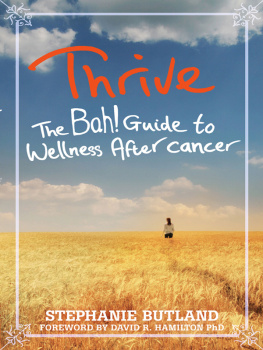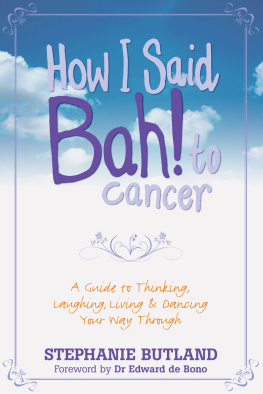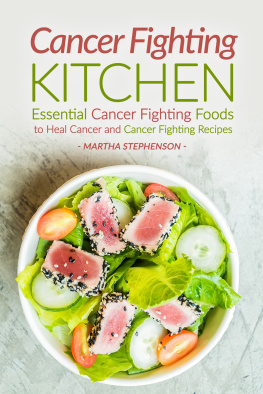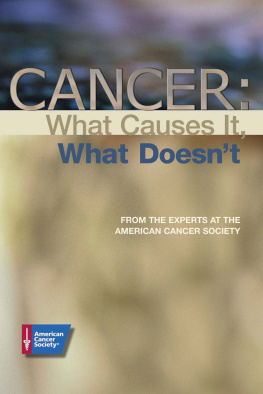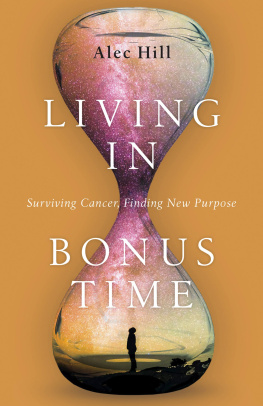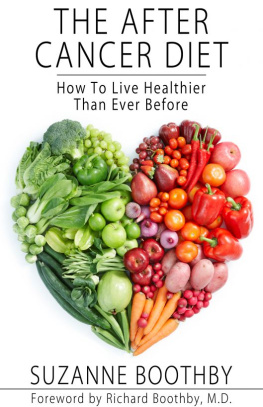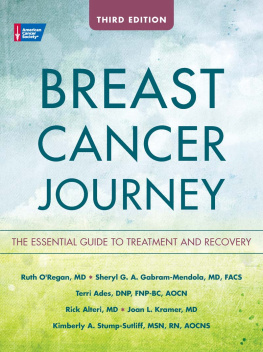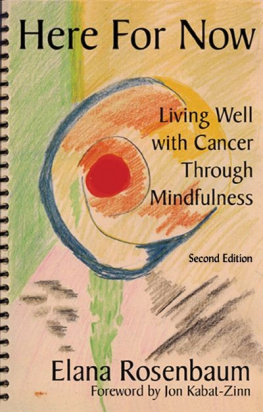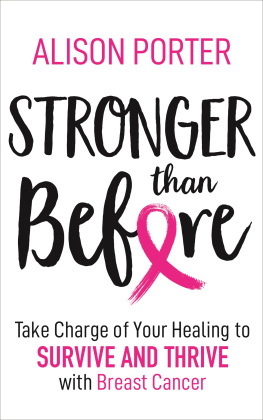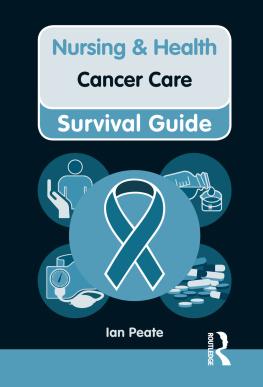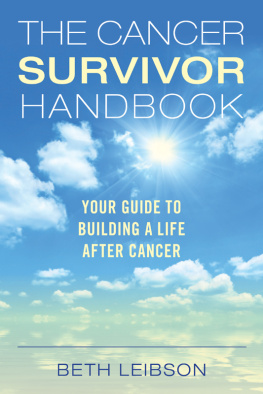Thrive is not a book I would normally read. After all I dont have cancer and, like everyone else, I think that cancer is something that only happens to other people. And when I started to read it, I didnt expect to finish, only I did. I am mindful now how I describe its author, as feisty and determined she is. I worry if calling her brave might be the wrong adjective, so I will settle for inspiring instead. Because whether this dreadful disease that affects us all has to be tamed, defeated, fought or succumbed to, this book will be a great guide for the people it visits and also a great solace and as such I am pleased to be able to thoroughly commend it to all.
Dominic Holland, author and comedian
Truthful, funny and helpful, this book is the straight-talking best friend that will help you through your cancer journey or support a loved one on theirs.
Irish Tatler
A must read for any woman who wants to be proactive in her approach to cancer treatment.
Take a Breakmagazine
First published and distributed in the United Kingdom by:
Hay House UK Ltd, 292B Kensal Rd, London W10 5BE.
Tel.: (44) 20 8962 1230; Fax: (44) 20 8962 1239.
www.hayhouse.co.uk
Published and distributed in the United States of America by:
Hay House, Inc., PO Box 5100, Carlsbad, CA 92018-5100.
Tel.: (1) 760 431 7695 or (800) 654 5126; Fax: (1) 760 431 6948 or (800) 650 5115.
www.hayhouse.com
Published and distributed in Australia by:
Hay House Australia Ltd, 18/36 Ralph St, Alexandria NSW 2015.
Tel.: (61) 2 9669 4299; Fax: (61) 2 9669 4144.
www.hayhouse.com.au
Published and distributed in the Republic of South Africa by:
Hay House SA (Pty), Ltd, PO Box 990, Witkoppen 2068.
Tel./Fax: (27) 11 467 8904. www.hayhouse.co.za
Published and distributed in India by:
Hay House Publishers India, Muskaan Complex, Plot No.3, B-2,
Vasant Kunj, New Delhi 110 070. Tel.: (91) 11 4176 1620; Fax: (91) 11 4176 1630.
www.hayhouse.co.in
Distributed in Canada by:
Raincoast, 9050 Shaughnessy St, Vancouver, BC V6P 6E5.
Tel.: (1) 604 323 7100; Fax: (1) 604 323 2600
Text Stephanie Butland, 2012
The moral rights of the author have been asserted.
All rights reserved. No part of this book may be reproduced by any mechanical, photographic or electronic process, or in the form of a phonographic recording; nor may it be stored in a retrieval system, transmitted or otherwise be copied for public or private use, other than for fair use as brief quotations embodied in articles and reviews, without prior written permission of the publisher.
The information given in this book should not be treated as a substitute for professional medical advice; always consult a medical practitioner. Any use of information in this book is at the readers discretion and risk. Neither the author nor the publisher can be held responsible for any loss, claim or damage arising out of the use, or misuse, or the suggestions made or the failure to take medical advice.
A catalogue record for this book is available from the British Library.
ISBN 978-1-84850-966-5 in print
ISBN 978-1-78180-040-9 in ePub format
ISBN 978-178180-041-6 in Mobipocket format
For Alan, Ned and Joy,
the lights of my life
When I was still calling myself a survivor, and wishing I could think of a better word for it, Natalie Jenkins told me she was thriving after cancer, and in doing so lightened my steps, made me smile and breathed life into the beginnings of this book.
A lot of people who are on the road to thriving took the time to answer my questions, and Anna, Natalie, Rachel, Keith, Liz, Gaynor, Jenny, Allison and Debbie agreed to be quoted. Thank you.
Dr David Hamilton understands exactly what this book is about. Im so glad he wrote the foreword
Oli Munson of Blake Friedmann remains the Best Agent Ever. He even wears the hat I knitted him.
At Hay House, my editor Carolyn Thorne is intelligent, insightful and genuinely collaborative, and Jo Burgess and her team continue to be tirelessly enthusiastic on behalf of Bah!. Barbara Vesey did another fantastic job of copy-editing.
The work of Dr Edward de Bono first showed me that practical thinking strategies work, and matter.
My husband Alan, my children Ned and Joy and my parents Helen and Michael Breeze continue to be supporters, cheerleaders and sounding-boards in all that I do. I cant imagine thriving without them.
I owe sincere and special thanks to my friends for helping me to understand what Im doing in these pages, and for doing it with such good grace, love, feedback, conversation, questions, coffee, cake and wine. Jude Evans, Nathalie Giauque, Kym Hadwin, Rebecca Leete, Scarlet Long, Emily Medland, Diane Mulholland, Louise Williams, Im looking at you. Alan Butland and Susan Young, you are technically family, but the same goes for you.
Most importantly of all, Bah! blog and book readers remind me that I have something to say about cancer. Im grateful to you and glad of your help. I hope the words in this book find you where you are, and help you to get to where you want to be.
Thrive is a great word. It is so positive!
One of the things I love about Stephanies writings is that they help you to feel empowered. Its all too easy to feel that we have no control over the circumstances of our lives, but Stephanie offers us a way to feel that there are things we can do, practical ways of acting, and healthy ways to think that give us a feeling that we can navigate our own course in life.
The mind is a powerful tool. I have written and spoken about it extensively. As a former scientist in the pharmaceutical industry, I became fascinated by the results of drugs trials where large numbers of ill people improved their health by taking placebos, even though the pills were often mostly sugar or blackboard chalk. It turns out that everything we think about alters the chemistry of our bodies.
So I love that Stephanie shares some visualizations in the book because they are a powerful way to use the mind. They are significant symbolic exercises, but in many ways the brain doesnt distinguish between real and imaginary. We know this from research at Harvard University where volunteers played a simple combination of piano notes for five consecutive days. Their brains were scanned every day and changes were noted as the brain responded to the movements a phenomenon known as neuroplasticity. When the scans were placed side by side those who played the notes and those who imagined them they were almost identical. The brain had significantly changed in both cases. Imagination had actually changed brain structure. If we can do that, what else are we capable of doing?
That is such an empowering idea because it allows us to use our imaginations in any way we wish, and know that our imaginings are not empty, floaty things, but ideas that have real and potent effects in our bodies and our lives. The thought of thriving instead of surviving impacts how we think and alters the chemistry of our lives. Its about where we point the mind. Thriving seeds positive and creative ideas, strategies for navigating the often-difficult terrain of life, and it breeds hope and self-belief.
So I hope you enjoy reading this book. It is packed full of great ideas and numerous practical exercises, and it is written with a delightful and somewhat refreshing blend of good humour, common sense, honesty, and compassion that only a person who has gone through the experience of cancer and learned to thrive afterwards could write.
I hope you find what you need in this book and that it helps you to thrive.
David R. Hamilton PhD
Next page
